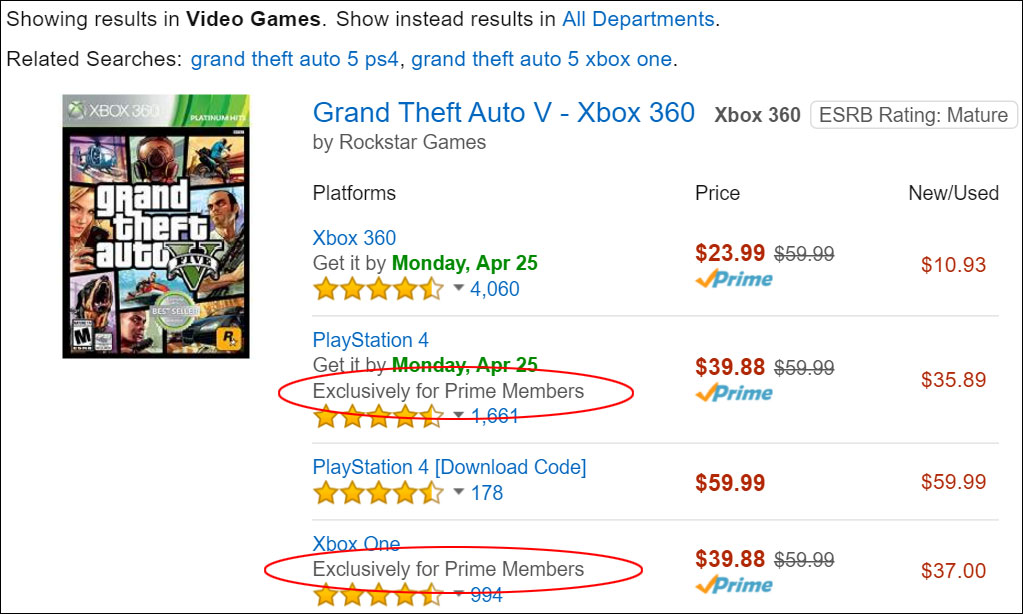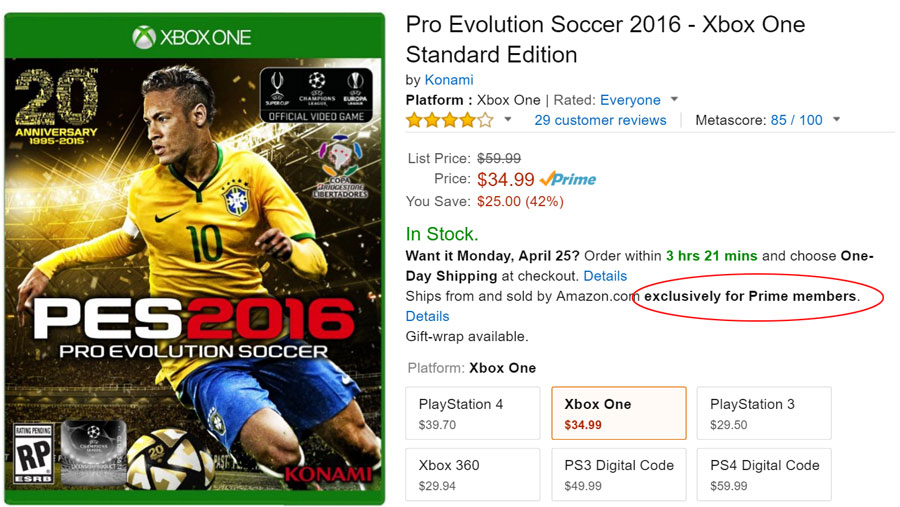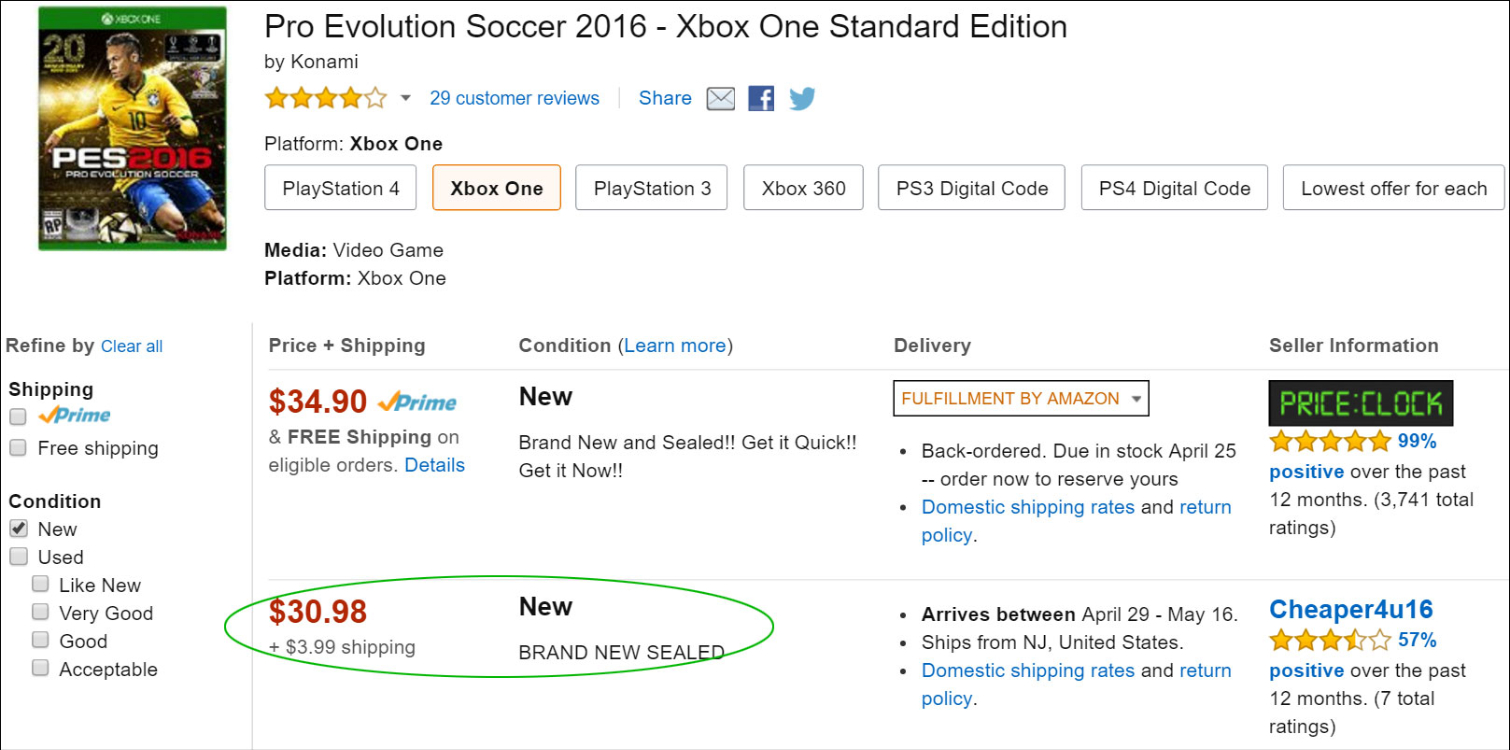Amazon’s Game Lockout Is Bad Sign of Things to Come
Amazon has begun restricting the sale of popular video games to Prime members, and the big company is not likely to stop there.

I understand and accept that Amazon Prime is a cool kids' club to which I'll probably never belong. I see the appeal: Drop a Benjamin, and for a year, Amazon treats you like royalty. Unlimited streaming video, free two-day shipping and a Kindle lending library are great perks, to be sure, but that's what they are: perks. They were never really supposed to lock more casual customers out of buying stuff. Until today.
On Apr. 22, Videogamer reported a curious phenomenon affecting Amazon.co.uk, which is also happening on the American version of the site: Shoppers were being locked out of ordering popular video games like Grand Theft Auto V, Assassin's Creed Syndicate and FIFA 16 unless they are Prime members. The list was extensive, and covered games from a who's who of publishers, including Rockstar, Ubisoft, Electronic Arts, Konami and Warner Brothers.

Surely, this was a mistake. No reasonable company could want to prevent its customers from patronizing it, right? Wrong. Amazon responded to Videogamer's query in no uncertain terms: "One of the many benefits of Amazon Prime is access to exclusive selection on a number of great products. Customers who are not Prime members can sign-up for a 30-day free trial of Amazon Prime, or they can purchase those items from a Marketplace seller."
MORE: What Is Amazon Prime?
Amazon gave Polygon a slightly more detailed response than Videogamer, and explained that sometimes an item's Prime exclusivity status is temporary. (The company did not clarify whether this is one of those times.)
The idea of someone buying an Amazon Prime subscription just to purchase a full-price copy of Grand Theft Auto V is baffling.
Well, there you have it. Amazon, the company that wants to sell you literally anything, does not want to sell you hit video games unless you pony up an additional $100 per annum for the privilege. After that, you're still on the hook for the game's price, plus tax, although you do at least get free shipping.

The idea of someone buying an Amazon Prime subscription just to purchase a full-price copy of Grand Theft Auto V is baffling. Even assuming that Gamestop, Best Buy, Wal-Mart, Target, eBay, Newegg, Toys R Us and your local mom-and-pop game store all took turns kicking your dog, and thus you never want to shop there again, you can still just use the Amazon Marketplace vendors, many of whom are cheaper than Amazon's standard pricing anyway. While Marketplace fraud is much more common than it should be, buying popular video games is usually a solid bet, given the preponderance of reliable dealers and abundance of user reviews.
With so many other buying options, Amazon's decision is not likely to have much, if any, effect on everyday consumers. Likewise, its effect on the companies that produce the games will be likewise minimal. I contacted the major publishers, as well as consumer advocacy analysts, and no one was interested in discussing the story. For the moment, it appears to be a non-issue.

Ay, there's the rub that makes calamity of consumer expectations. For as long as anyone can remember (well, since 1995), Amazon has been one of the most populist shops on the 'net. First, you didn't need to pay boutique prices for books; next, you didn't need to cough up tons of money for DVDs, or clothing, or shipping costs, or electronics or streaming content. Even before Amazon had the biggest selection, it had one of the most consumer-friendly attitudes around.
With the introduction of Amazon Prime, all that has changed. The company has slowly been taking away features from the average shopper rather than adding them. As the Kindle became more and more popular, the prices of e-books crept north until they were on a par with their print brethren. During the past few years, the company has raised the free shipping minimum from $25 to $50 in a clear attempt to woo people to Prime. Unless you have Prime, you can't even access certain areas of the store, like Amazon Dash or Restaurant Delivery for same-day delivery on food and other convenience items.
What if you had to go elsewhere for Fallout 4, the Star Trek movie collection on Blu-ray, a huge bottle of detergent and a dress shirt for a wedding next week?
Granted, the services that Amazon offers with Prime aren't free, and there's no reason why the company shouldn't make some money for providing them. But one wonders what the company is hoping to accomplish by restricting access to hit games, and where it intends to go from here. Why not start restricting availability on other items, like hit DVDs or household necessities? (UPDATE: It did. At present, only Prime users can buy Star Wars: The Force Awakens on Blu-ray, and if you look around, you'll see other movies, games and music behind a similar paywall.)
Having to go elsewhere for Fallout 4 might not convince you to subscribe to Prime, but what if you had to go elsewhere for Fallout 4, the Star Trek movie collection on Blu-ray, a huge bottle of detergent and a dress shirt for a wedding next week? Suddenly, that $100 subscription might not seem so bad — even though it's more blackmail than enticement.
MORE: PS4 vs. Xbox One: Which Console Is Right For You?
Remember, too, that Amazon tracks what you buy, what you watch and how your tastes change over time. What's to stop the company from using predictive algorithms that put only the items you want behind a Prime paywall? If you think that you could sidestep this process, you're probably right — just like you can sidestep buying popular video games. But at what point does the annoyance outweigh the savings?
The pay-to-play model works for bulk retailers such as Costco and Sam's Club, and by that logic, it’s not ridiculous for Amazon to do the same thing. After all, Amazon sells huge packs of toilet paper and candy, same as Costco, and even follows the latter’s trend of selling electronics at a slight discount. But the writing on the wall seems clear: Amazon is making a ton of money by providing things via Prime, and at the same time, it's making things pricier and more restricted for everyone else.
Of course, you can always take your business elsewhere — until that store, too, realizes how much money it can make by offering "memberships" for stuff that used to be free. Caveat emptor.
Cover image credit: Shutterstock / wavebreakmedia
Sign up to get the BEST of Tom's Guide direct to your inbox.
Get instant access to breaking news, the hottest reviews, great deals and helpful tips.
Marshall Honorof is a senior editor for Tom's Guide, overseeing the site's coverage of gaming hardware and software. He comes from a science writing background, having studied paleomammalogy, biological anthropology, and the history of science and technology. After hours, you can find him practicing taekwondo or doing deep dives on classic sci-fi.
-
ssddx bad business decision. if it starts affecting too many products amazon might soon find itself losing customers to services which are not so greedy.Reply
if amazon is trying to lure more people to prime then it would help to sweeten the pot instead of trying to force subscriptions. the one method may give them a good impression and continued membership while the other often leaves a sour taste in the mouth which may lead to looking for other places to buy merchandise.
i've always enjoyed using emazon given the prices and quick delivery. it would be a shame if they continued on this trend. -
kyzarvs So Amazon gives you the clear choice to buy off their website using a third party supplier or makes you use Prime for their copy? So you can use the same website, to buy the same stuff, just choosing supplier?Reply
Do you get a special on all the tinfoil you buy for your hats? -
Phelan_13 The "Exclusively for Amazon Prime members" refers to the discounted price you pay for select new games and pre-orders. If you are not an Amazon Prime member, you can still purchase the brand new game from them, it will just be at retail value. Amazon introduced a discount for Prime members on new releases and pre-orders to compete with Best Buy's gamer club, which offers similar discounts on pre-ordered games.Reply -
reactive I am a Prime member in the UK, and the price is far too high for what you get, but it's not completely useless - getting fast free deliveries even late on a Sunday is very handy. As a side-benefit, Amazon Prime TV (without which my smart TV would be a bit dead) has some very good original content. Amazon is and will remain a big greedy company, but I find it odd that some people happily pay an obscene £40-50/month for mountains of crap Sky TV, while others complain at paying £79 GBP for a year's worth of Prime.Reply -
ian_d_r As a prime member if stock is low, I expect Amazon to sell it to me, rather then a none member....Reply
Most 3rd party sellers don't give me the fast "free" prime shipping, but are OK for none prime members. Therefore if the stock is low, get the none members to buy from the 3rd party resellers. -
CU Jimmy Reply
£79 is amazing value for money for unlimited next day delivery. Everything else with Prime is a bonus.17870051 said:I am a Prime member in the UK, and the price is far too high for what you get, but it's not completely useless - getting fast free deliveries even late on a Sunday is very handy.
-
duer Glad to hear it. Keep them thar neer do wells at bay. I pay my bucks and expect the excellent treatment I have gotten the past several years. Exceptional customer service the few times I needed it. Just all together a totally satisfied experience. Truly.Reply -
Ed1049 Imagine those on a fixed income. In order to purchase medication, they have to forgo food, now Amazon wants to jeopardize them even more by insisting they purchase a Prime Membership. When does all this end? Some day everyone is going to have their chance at living on a fixed income and maybe then they'll get the picture. Whatever is done today will only get worse over time.Reply

